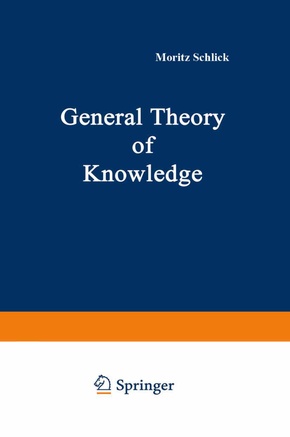General Theory of Knowledge
| Verlag | Springer |
| Auflage | 1974 |
| Seiten | 410 |
| Format | 23,5 cm |
| Gewicht | 900 g |
| Artikeltyp | Englisches Buch |
| Reihe | LEP Library of Exact Philosophy 11 |
| ISBN-10 | 3211811605 |
| EAN | 9783211811603 |
| Bestell-Nr | 21181160A |
to that goal, and it is hoped that it will incorporate further works dealing in an exact way with interesting philosophical issues. Zürich, April 1973 Mario Bunge From the Preface to the First Edition It may seem odd that aseries of works devoted to the natural sciences should indude - indeed begin with - a volume on phi losophy. Today, of course, it is generally agreed that philosophy and natural science are perfectly compatible. But to grant the theory of knowledge such a prominent position implies not only that these two fields are compatible, but that there is a natural connection between them. Thus the indusion of this book in the series can be justified only if such an intimate relation of mutual dependence and interpenetration really does exist. Without anticipating what is to come, the author would like first to explain his point of view on the relationship between epistemology and the sciences, and in so doing make dear at the outset the method to be followed in this book . It is my view - which I have already expressed elsewhere and which I never tire of repeating - that philosophy is not aseparate science to be placed alongside of or above the individual disciplines. Rather, the philosophical element is present in all of the scienccs; it is their true soul, and only by virtue of it are they sciences at all.
Inhaltsverzeichnis:
I. The Nature of Knowledge.- 1. The Meaning of the Theory of Knowledge.- 2. Knowing in Everyday Life.- 3. Knowing in Science.- 4. Knowing by Means of Images.- 5. Knowing by Means of Concepts.- 6. The Limits of Definition.- 7. Implicit Definitions.- 8. The Nature of Judgments.- 9. Judging and Knowing.- 10. What is Truth?.- 11. Definitions, Conventions and Empirical Judgments.- 12. What Knowledge is Not.- 13. On the Value of Knowledge.- II. Problems of Thought.- 14. The Interconnectedness of Knowledge.- 15. The Analytic Character of Rigorous Inference.- 16. A Skeptical Consideration of Analysis.- 17. The Unity of Consciousness.- 18. The Relationship of the Psychological to the Logical.- 19. On Self-Evidence.- 20. So-Called Inner Perception.- 21. Verification.- III. Problems of Reality.- A. The Positing of the Real.- 22. Formulating the Question.- 23. Naive and Philosophical Viewpoints on the Question of Reality.- 24. The Temporality of the Real.- 25. Things-In-Themselves and the Not ion of Immanence.- 26. Critique of the Notion of Immanence.- a) Unperceived Objects.- b) Objects Perceived by Several Individuals.- B. Knowledge of the Real.- 27. Essence and "Appearance".- 28. The Subjectivity of Time.- 29. The Subjectivity of Space.- 30. The Subjectivity of the Sense Qualities.- 31. Quantitative and Qualitative Knowledge.- 32. The Physical and the Mental.- 33. More on the Psychophysical Problem.- 34. Objections to Parallelism.- 35. Monism, Dualism, Pluralism.- C. The Validity of Knowledge of Reality.- 36. Thinking and Being.- 37. Knowing and Being.- 38. Is There a Pure Intuition?.- 39. Are There Pure Forms of Thought?.- 40. On Categories.- 41. On Inductive Knowledge.- Index of Names.

